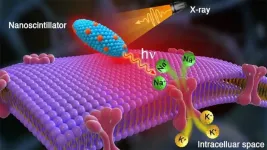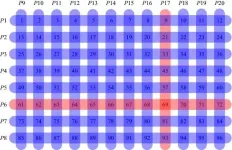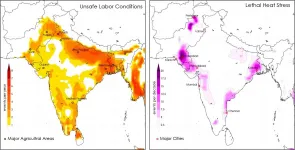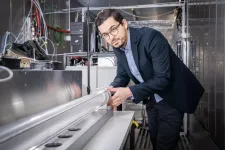Survey of Geisinger employees shows increasing acceptance of COVID-19 vaccines
Research also reveals reasons for COVID-19 vaccine hesitancy among healthcare workers
2021-03-24
(Press-News.org) DANVILLE, Pa. - A survey of Geisinger employees conducted over two weeks in December 2020 found a steady increase in intent among healthcare workers to receive the COVID-19 vaccine.
On Dec. 4, 2020, an announcement about anticipated vaccine availability was emailed to all 23,784 Geisinger employees. Recipients were asked to indicate their intention to receive a vaccine when one was available to them and the reasons for any hesitation they might have. More than two-thirds of employees responded to the survey.
Of those who completed the survey before Dec. 10, when an independent FDA advisory committee voted to recommend emergency use authorization (EUA) of the Pfizer-BioNTech COVID-19 vaccine, 53.2% said they would receive a COVID-19 vaccine. By contrast, 80.2% of those who completed the survey after that date said they planned to receive a vaccine. Results of the study were published in JAMA Network Open.
The percentage of employees responding that they intended to receive a vaccine rose steadily after the Dec. 10 vote, coinciding with other widely publicized events, including a vote to recommend EUA for the Moderna vaccine, recommendations for both vaccines by the Centers for Disease Control and Prevention, and news coverage of prominent members of both political parties receiving the vaccine.
"The observed substantial increase in acceptance during the survey period should be interpreted cautiously because of the reduced sample size over time and because survey latecomers may not be representative," the research team wrote. "Still, intervening events may have signaled that receiving a vaccine is safe, normative, historic, and an indication of (healthcare workers') important role in the pandemic response."
Overall, 55.3% of employees said they intended to receive a vaccine, with 16.3% responding that they would decline and 28.4% saying they were undecided. Of those employees who indicated they would not receive the vaccine or were unsure, the vast majority (90.3%) said they worried about unknown risks of COVID-19 vaccines or felt there was insufficient data. Most employees completed the survey prior to the Dec. 10 EUA vote.
"As we near the day when there are enough vaccine doses for everyone who wants one, our attention will need to turn to the problem of vaccine hesitancy," said Michelle Meyer, lead author of the study and an assistant professor in Geisinger's Center for Translational Bioethics and Health Care Policy. "Healthcare workers are important ambassadors of vaccine acceptance for their patients and members of the public. That they appear to be much more accepting themselves of COVID-19 vaccines than several earlier surveys suggested is very good news for public health."
INFORMATION:
Geisinger has an exciting research environment with more than 50 full-time research faculty and more than 30 clinician scientists. Areas of expertise include precision health, genomics, informatics, data science, implementation science, outcomes research, health services research, bioethics and clinical trials.
About Geisinger
Geisinger is committed to making better health easier for the more than 1 million people it serves. Founded more than 100 years ago by Abigail Geisinger, the system now includes nine hospital campuses, a 550,000-member health plan, two research centers and the Geisinger Commonwealth School of Medicine. With nearly 24,000 employees and more than 1,600 employed physicians, Geisinger boosts its hometown economies in Pennsylvania by billions of dollars annually. Learn more at END
ELSE PRESS RELEASES FROM THIS DATE:
2021-03-24
News coverage of expert scientific evidence on vaccine safety is effective at increasing public acceptance of vaccines, but the positive effect is diminished when the expert message is juxtaposed with a personal narrative about real side effects, new research has found.
The study, by researchers affiliated with the Annenberg Public Policy Center (APPC) of the University of Pennsylvania and the University of Illinois, tested the effects of messages about vaccination in televised news reports. These included video clips of Dr. Anthony Fauci, director of the U.S. National Institute of Allergy and Infectious Diseases, talking about evidence supporting the value and safety of the MMR (measles, mumps and rubella) vaccine, and a mother who's refusing to vaccinate ...
2021-03-24
Scientists make pivotal discovery of method for wireless modulation of neurons with X-rays that could improve the lives of patients with brain disorders. The X-ray source only requires a machine like that found in a dentist's office.
Many people worldwide suffer from movement-related brain disorders. Epilepsy accounts for more than 50 million; essential tremor, 40 million; and Parkinson's disease, 10 million.
Relief for some brain disorder sufferers may one day be on the way in the form of a new treatment invented by researchers from the U.S. Department of Energy's (DOE) Argonne National Laboratory and ...
2021-03-24
Researchers Mario Guarracino the HSE Laboratory of Algorithms and Technologies for Networks Analysis in Nizhny Novgorod and Julius ?ilinskas and Algirdas Lančinskas from Vilnius University, have proposed a new method of testing for COVID-19. This group method allows results to be obtained 13 times faster as compared to individual testing of each sample. The research paper was published in the journal Scientific Reports.
The COVID-19 pandemic has already affected millions of people from over 200 countries. The rapid virus expansion demonstrated how fast such infections can spread in today's globalized world. At the beginning of the pandemic, when little was known about the virus and vaccines had not yet ...
2021-03-24
WASHINGTON--Residents of South Asia already periodically experience heat waves at the current level of warming. But a new study projecting the amount of heat stress residents of the region will experience in the future finds with 2 degrees Celsius of warming, the population's exposure to heat stress will nearly triple.
Limiting warming to 1.5 degrees Celsius will likely reduce that impact by half, but deadly heat stress will become commonplace across South Asia, according to the new study in Geophysical Research Letters, AGU's journal publishing high-impact, short-format reports with immediate implications spanning all Earth and space sciences.
With ...
2021-03-24
An old technique flexes its muscles
Sarcomeres are small repeating subunits of myofibrils, the long cylinders that bundle together to make the muscle fibres. Inside the sarcomeres, filaments of the proteins myosin and actin interact to generate muscle contraction and relaxation. So far, traditional experimental approaches to investigate the structure and function of muscle tissue were performed on reconstructed protein complexes or suffered from low resolution. "Electron cryo-tomography, instead, allows us to obtain detailed and artefact-free 3D images of the frozen muscle", says Raunser.
Cryo-ET was for a long time an established yet niche methodology. But recent technical advances in electron cryo-microscopy (cryo-EM) as well as the new development of ...
2021-03-24
In the heart of black cherry's native range, including a part of the Allegheny Hardwoods that bills itself as the "Black Cherry Capital of the World," the tree's regeneration, growth and survival have all been declining for more than a decade. In a new analysis, a team of USDA Forest Service and University of Missouri scientists identify likely factors behind the tree's decline and, more significantly, conclude that black cherry may be the tip of the iceberg in terms of change in eastern deciduous forests.
Scientists used a combination of synthesis of existing research and new analyses to examine the leading hypotheses for black cherry's regeneration failure. They conclude that the two factors that are ...
2021-03-24
Family-centered prevention programs that foster protective caregiving can buffer the negative effects of racial discrimination on young Black people, according to a study published by University of Georgia researchers.
Research shows that Black youth exposed to various levels of racial discrimination--including slurs, threats and false accusations--are at a high risk for poor mental health outcomes such as hopelessness, conduct problems, drug use and depression. After participating in family-oriented programs, high school-age adolescents who encountered high levels of racial discrimination and received supportive caregiving evinced fewer increases in conduct problems and depression/anxiety symptoms two years later.
"This research shows that ...
2021-03-24
The high temperatures and pressures of the Earth's mantle forge carbon-rich minerals known as carbonates into diamond. But less is known about the fate of carbonates that travel even deeper underground -- depths from which no sample has ever been recovered.
Now, Michigan State University's Susannah Dorfman and her team are unearthing an answer with lab tools that mimic these extreme conditions.
"What we were interested in is, when is carbon not diamond?" added Dorfman.
In a paper recently published in Nature Communications, scientists in Dorfman's Experimental ...
2021-03-24
Researchers at the Paul Scherrer Institute PSI have studied for the first time how chemical reactions in clouds can influence the global climate. They found that isoprene, the dominant non-methane organic compound emitted into the atmosphere, can strongly contribute to the formation of organic aerosols in clouds. They published their results today in the journal Science Advances.
Aerosols, a mixture of solid or liquid particles suspended in the air, play an important role in Earth's climate. Aerosols originate either from natural or human sources. They influence Earth's radiation balance by interacting with sunlight and forming clouds. However, their effect remains the single most significant uncertainty ...
2021-03-24
CHICAGO -- Immunotherapy, which recruits the body's own immune system to attack cancer, has given many cancer patients a new avenue to treat the disease.
But many cancer immunotherapy treatments can be expensive, have devastating side effects, and only work in a fraction of patients.
Researchers at the Pritzker School of Molecular Engineering at the University of Chicago have developed a new therapeutic vaccine that uses a patient's own tumor cells to train their immune system to find and kill cancer.
The vaccine, which is injected into the skin just like a traditional vaccine, stopped ...
LAST 30 PRESS RELEASES:
[Press-News.org] Survey of Geisinger employees shows increasing acceptance of COVID-19 vaccines
Research also reveals reasons for COVID-19 vaccine hesitancy among healthcare workers




